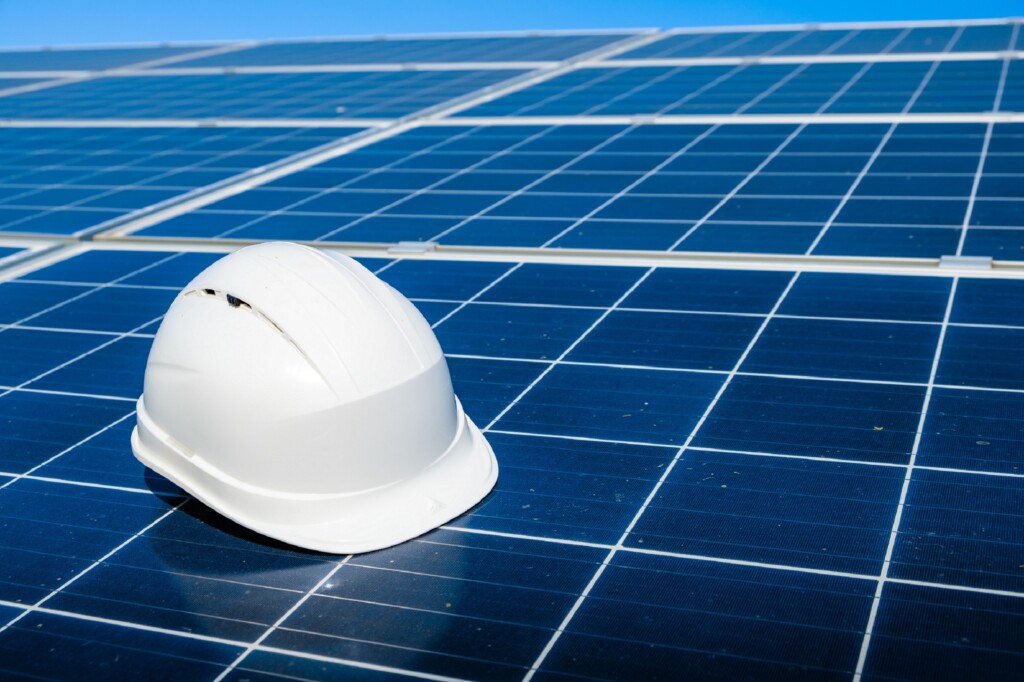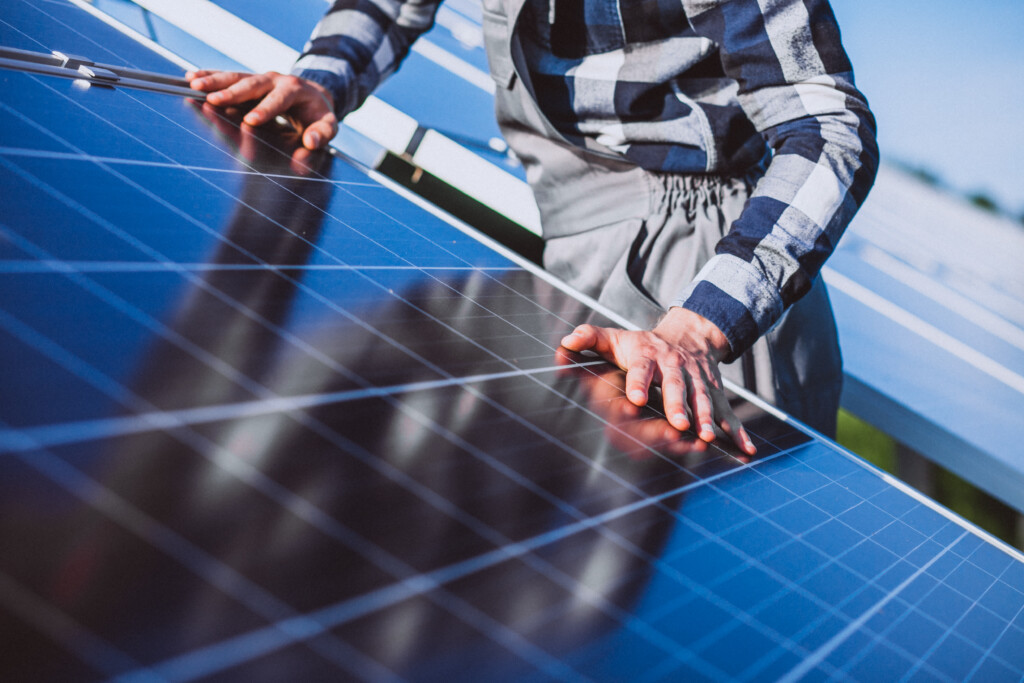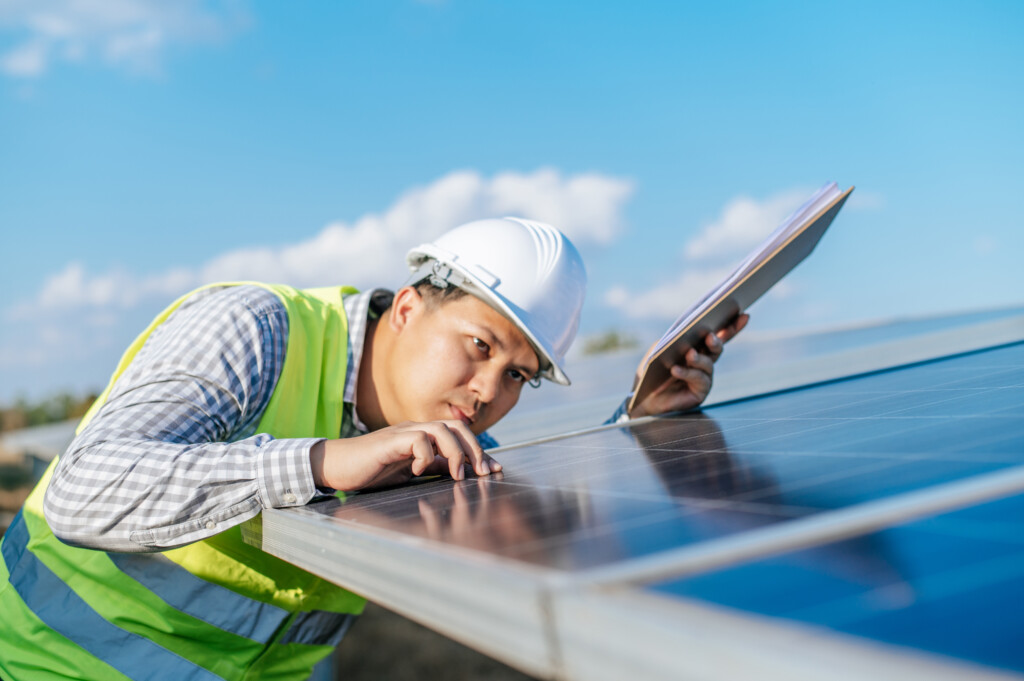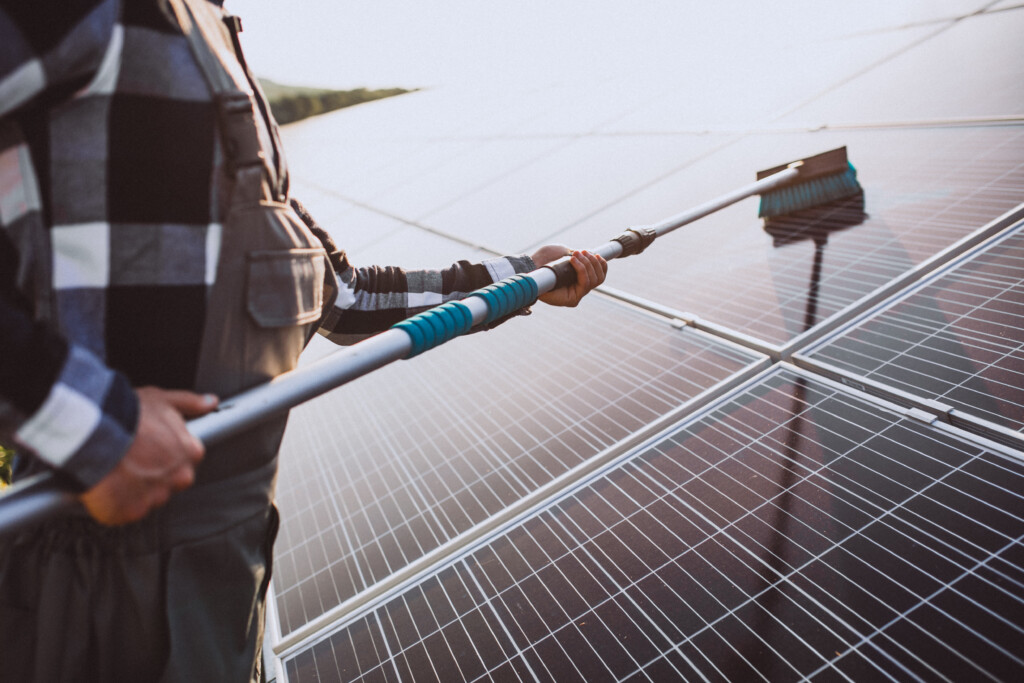Solar panels are a fantastic investment for reducing energy costs and shrinking your carbon footprint. Like any other home system, solar panels require a degree of care and upkeep. Although low-maintenance compared to most appliances, ensuring your solar panels are in top condition will help you reap the benefits over their expected lifespan of 25 to 30 years. Dirt and dust accumulation, a phenomenon known as “soiling,” can lead to significant annual energy losses, ranging from 7% in the US to a staggering 50% in the Middle East. But, how do we address this issue effectively? This guide will provide you with comprehensive information about the maintenance needs of solar panels, from the frequency and costs of upkeep to tips on cleaning solar panels.
Contrary to what many might think, solar panels need minimal maintenance. Due to their stationary nature and lack of moving parts, solar panels are generally less susceptible to issues compared to devices with intricate mechanical systems. However, it’s crucial to routinely monitor your solar panels to identify any potential problems. Key aspects to watch out for include dust and debris buildup which can hamper the panel’s performance.

Knowing when your solar panels need maintenance can be somewhat subjective, and is largely dependent on the specific circumstances of your installation. One clear indicator is a notable decline in system performance. For instance, if you observe a lower energy output over a period, despite similar weather conditions, this may be a sign that the panels need cleaning.
In many cases, specialized solar monitoring software can provide useful insights about your system’s performance. Such applications can offer real-time updates on energy production, allowing for prompt identification of any unanticipated performance drops, which may be indicative of a need for maintenance or repair. Some solar companies offer mobile apps that allow real-time tracking of your solar panel system’s performance, alerting you if there’s an unexpected dip in performance, indicating possible issues that may need attention.
Another factor to consider is seasonal variation. Accumulated grime is often more prominent during the colder months when atmospheric pollutants are more likely to stick to the panels. Consequently, cleaning solar panels thoroughly is often beneficial in spring when the weather warms up. It’s also worth noting that solar panels become extremely hot during the summer, so it’s best to schedule any required cleaning or maintenance activities for the morning or evening when the panels are cooler to touch. Remember, routine inspection and proactive maintenance are instrumental in maximizing the performance, efficiency, and lifespan of your solar panels.
While there’s no one-size-fits-all answer to how often solar panels should be maintained, a good rule of thumb is to inspect your solar panels at least twice a year. This frequency ensures you’re on top of any issues that might arise, such as dirt or debris build-up, physical damage, or shading issues.
Factors such as geographical location, weather conditions, and the local environment can significantly impact the frequency of maintenance. For instance, urban and industrial areas with high pollution levels often necessitate more frequent cleanings, potentially every two to three months, due to a thick layer of atmospheric grime and oil that can accumulate and obstruct sunlight. Solar panels situated in wooded areas might need monthly checks and cleaning depending on the density of trees and bird activity, as leaves and bird droppings can obstruct sunlight and reduce efficiency.
Desert environments or areas prone to wildfires, such as parts of California and Australia, might necessitate more regular cleaning, potentially once a month, to counteract dust, sand, and ash fallout. If you live in a region that experiences frequent dust storms or is prone to heavy snowfall, your solar panels might need cleaning and inspection more often, perhaps quarterly. The installation angle of your panels can also influence the need for maintenance. Panels installed at a steep angle are less likely to accumulate dust and debris than those installed at a flat or shallow angle. In the case of flat panels, rainwater may not wash away the dust effectively, necessitating more regular manual cleaning.
Every location comes with its unique set of challenges, requiring a customized approach to solar panel cleaning. Understanding these geographical nuances will ensure that you maintain your solar panels in the most effective way possible.

The cost of maintaining solar panels can vary widely based on the size of your system, your location, the extent of services you require, and the company you choose for the service. Generally, a professional solar panel inspection and cleaning service can range anywhere from $150 to $350 per visit. During an inspection, a professional will check the entire system, including the panels, mounting equipment, and wiring. They will look for any physical damage, dirt or dust buildup, shading issues, and any potential problems with the electrical systems. If they identify any problems, the cost of addressing these might be additional.
If you decide to clean the panels yourself, the cost will be significantly less, mainly involving the purchase of a cleaning kit or the materials required for cleaning. The cost of a cleaning kit typically ranges from $20 to $50, but bear in mind that doing it yourself requires time and effort, and could pose safety risks if your panels are mounted on a rooftop. There are also indirect costs to consider. For instance, if your solar panels are not maintained well and their efficiency drops, you might end up with higher electricity bills than anticipated. This decrease in power generation could delay the payback period of your solar panel investment.
Solar panel warranties typically come in two types: the performance warranty and the product or equipment warranty. The performance warranty guarantees that your solar panels will produce a certain percentage of their rated power output for a specified period, typically 25 years. If the panels fail to meet this performance level due to any inherent defect, the manufacturer is responsible for rectifying the issue. However, this does not cover issues caused by external factors like dust and dirt accumulation, which would fall under the purview of regular maintenance.
The product or equipment warranty covers defects in the material and workmanship of the solar panels. This warranty usually lasts for a shorter duration, typically between 10 to 12 years. It covers issues like premature wear and tear, discolouration of the panel, or any malfunction not caused by external factors. Like the performance warranty, it does not typically cover maintenance-related costs. Cleaning and regular check-ups usually fall outside of these warranties. Therefore, costs related to routine maintenance, including any professional cleaning services, would generally be the responsibility of the owner.
However, it’s worth noting that proper maintenance is essential to maintain the validity of these warranties, as neglect could potentially be grounds for voiding them. So, while warranties provide a safety net for issues related to manufacturing and performance, they usually do not cover routine maintenance costs. Always remember to check the specific terms and conditions of your warranty to understand what is and isn’t covered.
Optimize Your Solar Panel Placement: Solar panels should be installed in a position that gets the most sunlight throughout the day. Make sure to place them in a spot where they’re out of shade, especially during peak sunlight hours (9 am to 3 pm).
Regularly Monitor Your Inverter: The inverter converts the direct current (DC) produced by your solar panels into alternating current (AC) that your home appliances can use. It’s crucial to its operation, so check that the indicator lights are flashing green to confirm it’s working correctly. If they’re not, it might be time to call in a professional.
Keep a Performance Log: Documentation of your solar panels’ performance can help you keep track of any irregularities. Monitor and log their output regularly so that you can spot any drops in performance. Many solar panel systems come with an app or website where you can track performance data, which makes this task easier.
Consider a Monitoring System: Solar panel monitoring systems can help you keep track of your solar panel’s performance in real-time. They allow you to see how much electricity your panels are producing and how much you’re consuming. They also alert you to any issues with your system, enabling quicker responses to problems. Companies like Enphase, SolarEdge, Tesla and SunPower offer solar monitoring systems.
Explore Automated Cleaning Options: Automated cleaning systems can be a good investment if your solar panels are in hard-to-reach places or if you’re pressed for time. These systems can regularly clean your panels without any effort on your part.
Inspect Physical Components Regularly: Regularly inspect the physical parts of your solar panel system for signs of damage. This includes the panels themselves, the mounting equipment, and any visible wiring. Look for cracks in the panels, loose or frayed wiring, and loose or damaged mounting equipment. Prompt attention to these issues can prevent bigger problems down the line.
Check for Obstructions and Shade: Regularly check for new sources of shade on your panels, like growing trees or new buildings. Even small amounts of shade can significantly reduce your solar panels’ efficiency. Similarly, check for dust, debris, bird droppings, or snow that can block sunlight.
Avoid Over-Cleaning: While keeping your solar panels clean is important, over-cleaning can be counterproductive. Too much scrubbing can damage the glass surface or the frame. Generally, if your panels aren’t showing a decrease in performance, you can often leave them be.
Use Professionals for Repairs: While basic cleaning and maintenance can often be done yourself, always hire professionals for repairs. The electrical components of a solar panel system can be dangerous if not handled correctly. Plus, doing repairs yourself could void your warranty.
Evaluate Your Energy Consumption: Regularly evaluate your energy usage and compare it with the output of your solar panels. This can help you spot any inconsistencies, possibly alerting you to issues with your panels or your energy consumption habits.
By following these tips, you can ensure your solar panels remain efficient and functional for many years. The goal is to maximize your return on investment, and proper maintenance is key to achieving this.

Choosing the Right Cleaning Kit: If you’re cleaning the panels yourself, choose a solar panel cleaning kit equipped with biodegradable soap, a soft brush or wiper, and an extension pole. This setup is particularly important for those hard-to-reach panels.
Clean During Cool Periods: Always clean your solar panels when they’re not in direct sunlight. Early morning, late afternoon, or overcast days are the best times as the panels would be cool. This prevents the soap from drying on the panels and leaving a residue.
Use the Right Cleaning Material: Avoid using abrasive sponges, brushes, or harsh soaps, which can scratch and damage the surface of the panels. Instead, opt for soft brushes or sponges and gentle, biodegradable soaps.
Start with Plain Water: Often, plain water can remove most of the dust and debris. Start by spraying the panels with a gentle stream of water. If dirt still persists, then move to soap.
Use a Soft Brush and Soap Solution: If water alone isn’t sufficient, use a mild soap solution and a soft brush to clean the panels. Always start by dipping the brush into the soap solution and then softly brush on the panels in a circular motion.
Rinse Off Properly: After cleaning with soap, make sure to rinse off the panels properly. Any soap residue can attract more dust, which will block the sunlight and reduce the efficiency of your solar panels.
Prioritize Safety: If your panels are high up or in a location that requires you to climb, safety should be your first priority. Always use safety ropes or a harness for support, and if you’re uncomfortable or the panels are too high, consider hiring a professional.
Regular Cleaning for Maximum Efficiency: Regular cleaning ensures efficient sunlight absorption. Even a thin layer of dust or grime can affect the output of your panels. The cleaning frequency depends on your location and local conditions, but a general rule is to clean them every six months.
Consider Professional Cleaning Services: If cleaning your solar panels sounds like a daunting task, or if they’re in a hard-to-reach area, consider hiring a professional solar panel cleaning service. They’re experienced, equipped, and know how to clean without damaging your panels.
Follow Manufacturer’s Instructions: Finally, always follow the manufacturer’s instructions regarding cleaning. Different panels might require different cleaning methods, and failing to adhere to these instructions could void your warranty.
Cleaning solar panels isn’t a complicated process, but it’s crucial to do it correctly. With these tips, you’ll be able to keep your solar panels in the best shape, ensuring they provide clean and efficient energy for many years.

Now that we’ve covered the basic cleaning tips, let’s explore some innovative techniques for cleaning solar panels. These methods take advantage of advancements in technology and materials science to provide efficient and effective solutions to the challenges of maintaining solar panel cleanliness and functionality. From automated robotics to soap-less and waterless cleaning, there’s a wide range of techniques that can help you keep your solar panels in top condition.
Robotic Cleaning Technology: Several companies have turned to the power of technology to keep solar panels clean. For instance, Italy’s Washpanel has developed automatic and semi-automatic robots specifically designed for this purpose, providing portable robots for small scale installations and fixed ones for large, dust-prone environments. In the Middle East, Ecoppia has created solar-powered autonomous robots that clean PV panels using soft microfiber and airflow. These devices also have the capability to clean their own solar panels and recharge their batteries in short intervals.
Soap-less Cleaning: Certain companies have found innovative ways to clean panels without the use of soap, which can leave a residue that shades panels and attracts dirt. Companies like Bland Company and Premier Solar Cleaning use deionized water and brushes to clean the panels. Polywater has developed a Solar Panel Wash that helps water lift off grime without leaving a film behind, while SunSystem Technology uses a blend of diluted vinegar and hydrogen peroxide.
Waterless Cleaning: Researchers at Heriot-Watt University in Scotland and NASA have come up with methods to shake dust off solar panels by inducing vibrations, creating a waterless and effective cleaning solution.
Nanoparticle Coatings: Scientists at India’s International Advanced Research Centre for Powder Metallurgy and New Materials have developed a nanoparticle-based coating that prevents dirt accumulation. This technology is transparent and repels dust, allowing it to be washed off easily without impacting the panel efficiency.
Manual Cleaning: Although technological advancements have brought innovative solutions, manual cleaning remains a viable option, especially for small-scale installations. Using tools like rotating brushes or basic cleaning tools such as those used for car windshields can effectively clean solar panels. High-pressure water machines can also make this task quicker and water-efficient.
In essence, maintaining the efficiency of your solar panels is a multifaceted task that involves regular inspections, routine cleanings, and the use of innovative technologies and techniques. While solar panels are a relatively low-maintenance technology, ensuring their optimal performance requires an understanding of their care needs and the factors that influence them, such as geographical location.
Whether you choose to undertake this task yourself, use automated technology, or hire professionals, the ultimate goal is to keep your solar panels clean and in good working order. By doing so, you can ensure that your solar panels continue to generate renewable energy efficiently and contribute to a more sustainable future.
Maintaining your solar panels may require a small investment of time or money, but it’s worth remembering that this proactive approach will pay dividends over the long-term life of your panels. The cleaner your panels, the more efficient they are at converting sunlight into usable energy, which translates into more energy savings and a shorter payback period for your solar investment.
The frequency of cleaning largely depends on your location and environment. Generally, twice-yearly inspections are recommended. However, certain areas might require more frequent cleanings.
Typically, no. Warranties usually cover issues related to manufacturing defects or performance guarantees, not routine maintenance costs.
Yes, cleaning is essential to maintain the efficiency of solar panels. Debris, dirt, and grime can obstruct sunlight, reducing the energy production of your panels.
Stay a while and read more posts like this
In recent years, Europe has witnessed a remarkable surge in the adoption of solar panels, marking a pivotal shift towards renewable energy. Data from the...
Renewable Energy, Solar Energy, Solar Energy Basics, Solar Technology
“Unlock the Truth: Get the Facts on Solar Energy!” Introduction Solar energy is becoming increasingly popular as a renewable energy source, but there are...
Imagine a world where you’re able to cut your monthly energy expenditure substantially. A reality where your home isn’t reliant on finite,...